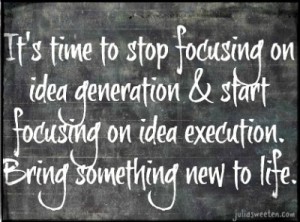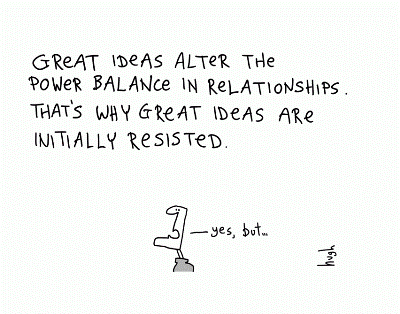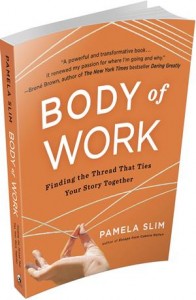As an entrepreneur and a creative writer, I steadily encounter the issue of having too many ideas popping up even in the middle of the (painful) execution of a previous idea. The same can be said of business opportunities, which are but a certain version of an idea.
 Ideas are cheap until they are executed; and execution is tough – you can’t execute so many ideas simultaneously with the right focus – a focus that is required to be ultimately successful. And time is scarce so you can’t properly execute fully too many ideas in a given timeframe.
Ideas are cheap until they are executed; and execution is tough – you can’t execute so many ideas simultaneously with the right focus – a focus that is required to be ultimately successful. And time is scarce so you can’t properly execute fully too many ideas in a given timeframe.
One of the issues is of course that during execution, new ideas will necessarily pop up from the work that you can’t just throw away for later. And some more from your life. What can you do? Bloggers and authors suggest several opposed strategies which can be summarized as follows:
- Note new ideas for later and ignore them for the time being (so as not to lose focus)
- Don’t bother about the sunken costs of what you’ve been doing – if a new idea has much higher merit just go for it, now (in start-up talk, “pivot”!)
I tend to believe that there is value being persistent in the execution of a idea, even if it does not turn out to be as successful as anticipated. The learning from executing an idea until the end is invaluable. At the same time, if a really great idea crosses your life it would be dumb not to go for it – but that should be quite a rare thing.
I thus suggest to go for a middle road: don’t stop executing what you’re doing but still do a basic ‘due diligence’ on your new ideas to evaluate their potential before deciding to go for it or not. In marketing terms, have an idea funnel. But still, do finalize execution on some ideas to get the learning, and limit the number of ideas you pursue at any one time to a handful!
Picture from Julia Sweeten’s blog post Stop Generating New Ideas with is a great glimpse into the struggles of the creator (although the issue might not be to stop generating ideas but how to recognize if a new idea might have more merit and value than the one you’re executing).
 Real good ideas do necessarily alter the power relationships (and that is why they are always resisted, but that is another story).
Real good ideas do necessarily alter the power relationships (and that is why they are always resisted, but that is another story).










